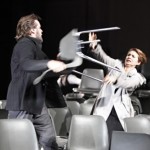By Rebecca Schmid
 Vladimir Putin has given the western world much reason for protest over the past year. There is the law banning homosexual “propaganda.” Two members of Pussy Riot still sit behind bars. According to some residents (and ex-residents) of the former Soviet Union, Russia is reverting to a full-blown totalitarian dictatorship. The businessman Michail Chodorkowski still sits in jail on dubious charges. Just last week, the government charged a Greenpeace ship crew with piracy following protests over an oil rig. Freedom of speech is not a given even on the internet.
Vladimir Putin has given the western world much reason for protest over the past year. There is the law banning homosexual “propaganda.” Two members of Pussy Riot still sit behind bars. According to some residents (and ex-residents) of the former Soviet Union, Russia is reverting to a full-blown totalitarian dictatorship. The businessman Michail Chodorkowski still sits in jail on dubious charges. Just last week, the government charged a Greenpeace ship crew with piracy following protests over an oil rig. Freedom of speech is not a given even on the internet.
Gidon Kremer, with his concert To Russia with Love at the Philharmonie yesterday—exactly seven years after the murder of journalist Anna Politkowskaja—set out to raise general awareness of the declining state for human rights. The foyer was lined with the stands of NGOs and non-profits: Amnesty International, Reporters without Borders, Osteuropa. A giant canvas hung for visitors to sign their name to the cause. But Kremer’s main motivation behind the concert, as he explains in an online video, was to counter the notion of music as entertainment. “Music should serve as a vehicle for expanding our emotions and confirming our ethics,” he says. He brought together coveted soloists with his ensemble Kremerata Baltica for a beautifully curated program that was streamed live on Arte .
It almost felt like a guilty pleasure to enjoy the artists under the circumstances. As Emmanuel Pahud and Khatia Buniatishvili performed a transcription of Lenski’s famous aria from Eugen Onegin, the flute’s luxurious tone bordered on the overly sentimental. Buniatishvili, in a floor-length, low back gown, also gave a virtuosic if flashy account of the agitated final movement from Prokofiev’s Piano Sonata No.7. But, following the impassioned speech of human rights activist Svetlana Gannushkina, the music served a clear dramaturgical purpose. The concert opened with a poem by Herta Müller which resembled more of an informative speech: “Putin thinks he is the law…intimidation is daily fare.” Kremer led a soulful reading of the third movement from Mieczysław Weinberg’s Sinfonietta Nr.2 which gave way without a pause to an eerily hushed Allemande from J.S. Bach’s Cello Suite Nr. 2 with Nicolas Altsteadt as soloist.
The cellist immediately switched to a bold, insistent tone for the last movement of Gubaidulina’s Seven Last Words, joined by bayan soloist Elsbeth Moser, who provided everything from atmospheric to ripping textures against glassy strings. The appearance of a Ukranian girls’ choir in traditional costume for Pärt’s Estonian Lullaby took on an appropriately ironic, if not tragic tone. It is worth noting that although the composer lives in Berlin, his work is rarely performed here.
Kremer’s lyrical taste in contemporary music found further expression in the premiere of Giya Kancheli’s Angels of Sorrow, dedicated to the 50th birthday of Chodorkowski. The Georgian composer blends solo violin, cello and piano into transcendent textures with choir, xylophone and string ensemble. When the approximately 20-minute piece breaks out into angry passages, they are quickly countered by celestial responses. A percussive melody to bass drum lends passages of the final section a Dies Irae quality, but the soothing choir and solo violin, even as it is reduced to wispy pizzicato, seem to reassure the listener that the heavens will have their way.
The second half of the program included moments of sardonic humor. Kremer, to impromptu accompaniment by Daniel Barenboim, took a deliberately modernist approach to the Rachmaninov/Kreisler Prayer which more often assumes the guise of feel-good film music. Martha Argerich brought playful energy to Shostakovich’s First Piano Concerto alongside the ironic interjections of trumpeter Sergei Nakariakov. Music from Russian composer Leonid Desyatnikov’s score to the film Target ended the evening on an upbeat note, from the free, tonal invention in Vivaldi’s January to the street scene of his Foxtrot.
Barenboim and Argerich joined for an encore of Schubert’s Grand Rondo in A-major, having warmed up to an even more gentle performance than last month at the Musikfest. Perhaps audiences in Berlin are simply spoiled, but one couldn’t help but perceive the music as an empty crowd-pleaser. As the listeners rose in enthusiastic applause, the atmosphere was one of prosperity and pride—less self-reflection than self-congratulation. A journalist sitting next to me noted how poorly Berlin’s Russian community was represented in the audience. Even intentions as sincere and courageous as those of Kremer’s intentions cannot escape the bourgeois trappings of classical music consumption. But he might have taken a step toward forcing the world to listen with different ears.
